大学英语导论课 第一节课
大学预科英语教材第一课
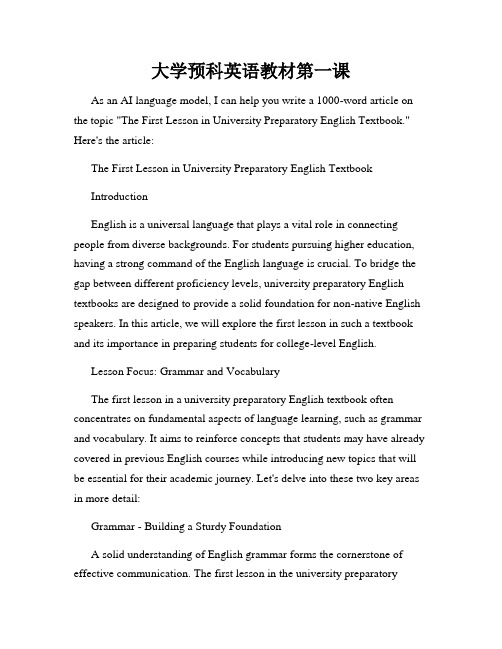
大学预科英语教材第一课As an AI language model, I can help you write a 1000-word article on the topic "The First Lesson in University Preparatory English Textbook." Here's the article:The First Lesson in University Preparatory English TextbookIntroductionEnglish is a universal language that plays a vital role in connecting people from diverse backgrounds. For students pursuing higher education, having a strong command of the English language is crucial. To bridge the gap between different proficiency levels, university preparatory English textbooks are designed to provide a solid foundation for non-native English speakers. In this article, we will explore the first lesson in such a textbook and its importance in preparing students for college-level English.Lesson Focus: Grammar and VocabularyThe first lesson in a university preparatory English textbook often concentrates on fundamental aspects of language learning, such as grammar and vocabulary. It aims to reinforce concepts that students may have already covered in previous English courses while introducing new topics that will be essential for their academic journey. Let's delve into these two key areas in more detail:Grammar - Building a Sturdy FoundationA solid understanding of English grammar forms the cornerstone of effective communication. The first lesson in the university preparatoryEnglish textbook dedicates ample time to reviewing and expanding students' knowledge of grammar rules. It may cover topics like verb tenses, sentence structures, agreement, and the correct usage of articles. Reinforcing these foundational concepts helps students communicate their ideas accurately and confidently in both written and spoken English.Vocabulary - Expanding the LexiconGrowing one's vocabulary is vital for expressing ideas precisely and conveying intended meanings. The first lesson also focuses on expanding students' vocabulary by introducing relevant words, idiomatic expressions, and collocations. This enhances their ability to interpret and produce nuanced English expressions. Building a strong vocabulary equips students with the necessary tools to excel in their coursework and future academic endeavors.Lesson Activities: Interactive LearningTo ensure active engagement and effective learning, the first lesson in a university preparatory English textbook incorporates various interactive activities:1. Pair and Group Discussions: Students engage in conversations based on prompts related to the lesson's grammar and vocabulary topics. This encourages collaborative learning, boosts confidence, and sharpens their speaking skills.2. Reading Comprehension: Texts tailored specifically for the preparatory level provide students with the opportunity to practice their reading skills while reinforcing grammar and vocabulary.3. Writing Practice: Students complete writing exercises focusing on sentence formation, paragraph development, and the incorporation of newly acquired vocabulary. This allows them to refine their writing abilities and enhances their overall language proficiency.4. Listening Exercises: Listening tasks, such as audio recordings or videos, are included to improve students' listening skills and expose them to authentic English accents and speech patterns.ConclusionThe first lesson in a university preparatory English textbook serves as the gateway to mastering the language skills required in higher education. By diligently attending to grammar and vocabulary, students can establish a sturdy foundation for their English language journey. Through interactive activities, they develop essential skills in speaking, listening, reading, and writing. By prioritizing these fundamental areas, the first lesson sets the stage for students to confidently navigate future college-level courses. As they progress, students will build upon this knowledge, ultimately becoming proficient English users ready to embrace academic success.Please note that this article is a mock response and the content may not accurately reflect an actual university preparatory English textbook.。
模块1 概述《英语专业导论》教学课件

第二节 英语专业的定位
第三节 英语相关专业介绍
• 国际商务
• ▲培养目标:本专业培养适应现代化市场经济需要,具备人文精神、科学素养 和诚信品质,具备经济、管理、法律和国际商务等方面的知识和能力,能够熟 练掌握一门外语并进行商务沟通,能在经济贸易部门及企业从事国际贸易和其 他国际化经营与管理活动的应用型、复合型人才。
• ▲主干学科与学位:本专业的主干学科是工商管理、经济与贸易。授予学位为 管理学学士。
第三节 英语相关专业介绍
• 翻译
• ▲培养目标:本专业旨在培养德才兼备、具有创新意识与国际视野的通用型翻 译专业人才,能够胜任外事、商务、教育、文化、科技、军事等领域中一般难 度的笔译、口译或其他跨文化交流工作,能成为国家哲学、社会科学走出去战 略,引进国际先进科学技术与文化的生力军。
• ▲主干学科与学位:本专业的主干学科是外国语言文学和中国语言文学。授予 学位为文学学士。
第二节 英语专业的定位
• ▲应用型本科大学英语专业的定位(以陕西安康学院为例)
• 英语专业旨在培养德、智、体全面发展的,掌握英语专业基础知识、基本理论 和英语交际技能,具备良好的职业素质,毕业后能在中小学、企事业单位从事 英语教育、商务翻译等工作的应用型人才。
第三节 英语相关专业介绍
• 商务英语
• ▲培养目标:本专业培养具有扎实的英语基本功、宽阔的国际视野、专门的国 际商务知识与技能,掌握应用语言学、应用经济学、工商管理学和国际商法等 学科相关知识和理论,了解国际商务活动规则,具备较强的跨文化商务交际能 力与较高的人文素养,能参与国际商务竞争与合作的应用型、复合型商务英语 专业人才。
大学英语第一册第一课
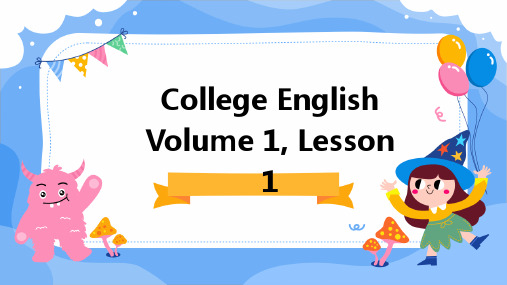
Critical Thinking
To develop students' analytical and critical thinking skills through discussions and debates on topics related to English language and culture.
Communication Skills
To improve students' ability to communicate effectively in English, both in formal and informal settings.
Course Outline
01
Unit 1: Language and Culture
The article also highlights important grammar points,
such as parallelism, subordination, and
modality.
These sentence structures and grammar points are used to enhance readability and to ensure that the message is clear and well-
Movie and TV dialogues
选取经典的电影和电视剧片段,让学生熟悉不同场景下的对话,提高 听力反应速度。
大学英美文学导论教案

大学英美文学导论教案1. 引言1.1 概述本教案旨在介绍和讲解大学英美文学导论课程的重要内容和主题,为学生提供深入了解英美文学发展历程和经典作品的机会。
通过本课程的学习,学生将能够掌握英美文学史、重要作家与作品、文学流派等基本知识,拓展其对西方文化和文学艺术的认知。
1.2 文章结构本教案共分为引言、正文、第二章节、第三章节以及结论五个部分。
其中引言部分将简要介绍全文内容,并阐述教案编写的目的与意义。
接下来的正文部分将详细探讨该课程所包含的主要内容,包括不同时期、不同流派与不同作家的代表性作品。
第二章节和第三章节将具体列举出若干典型案例进行详细阐述,以助于学生更好地理解和欣赏相关作品。
最后,在结论部分简要总结本课程对于培养学生对英美文学的研究兴趣与批判思维能力方面的积极影响。
1.3 目的本教案的编写旨在引导学生深入研究英美文学,培养他们对于文学作品的理解能力和批判思维能力。
通过课程学习,学生将能够掌握英美文学发展的主要历程与背景,了解不同时期和流派的特点,并深入阐释英美文化对于全球文学影响的重要性。
同时,通过对经典作家与作品的研究,学生将拓展自己的文化视野,丰富自身人文素养。
此外,本课程还将培养学生的批判性思维和分析能力,使他们具备对文学作品进行评价和解读的能力。
以上是“1. 引言”部分内容,请根据需要进一步添加补充相关内容。
2. 正文在这一部分中,我们将介绍大学英美文学导论的具体内容和教学方法。
本课程旨在让学生对英美文学的发展历程、作家及其作品有一个整体的认识,并培养学生对文学作品的批判性思维和分析能力。
2.1 课程背景大学英美文学导论是一门重要的人文科学课程,旨在提供对英美文学经典作品及其背后的历史、社会背景、流派等方面进行深入了解和分析的机会。
通过对经典作品的研究,我们可以更好地理解人类文化与价值观念的演变过程。
2.2 教学目标在这门课上,我们将追求以下教育目标:a) 了解英美文学的发展历程及其主要特点;b) 分析并理解不同时期、不同流派及其代表性作品;c) 培养阅读和批判性思考能力;d) 培养写作和表达能力;e) 培养跨文化交流与合作意识。
大学英语第一课教案
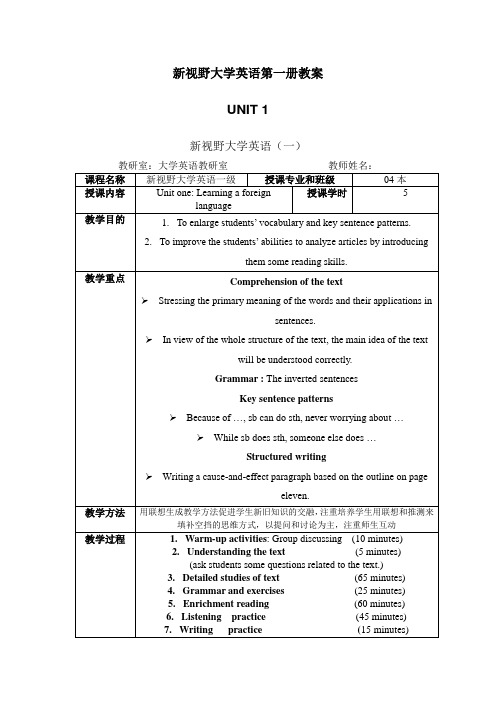
1.Vocabulary
2.Structure
3.Translation
Enrichment reading:
Elicit questions from the students, practice fast reading skills, focus on difficult sentences and cultural notes and improves students’ self-learning abilities.
Step 2:Ask the representatives of 2 or 3 groups to report the result of their discussion to the class.
2).Class discussion:
Summarize the answers to these questions.
6.Virtual:almost what is stated; made up
e.g The king was so much under the control of his wife that she was the
virtual leader of the country.
mitment:a promise to follow certain beliefs or certain course of actions
e.g Far from angry, he’s very happy.
e.g Her husband is far from handsome, he’s very ugly.
大学英语第一节课(课堂PPT)
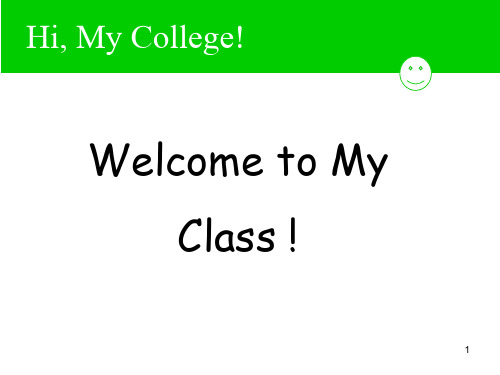
Hi, My College!
Some Rules to Follow
You must bring…
1. Two books Intensive reading book
& listening and reading book
2. A notebook
3. A pen
5
Hi, My College!
19
Hi, My College!
Thank you ! Let’s work hard together, I believe we
can achieve the goals we set.
20
关于大学英语四、六级考试题型调整的说明
自2013年12月考次起,全国大学英语四、六级考试委员会将对四、六级考试 的试卷结构和测试题型作局部调整。调整后,四级和六级的试卷结构和测试 题型相同。 二、新题型说明 1. 单词及词组听写 原复合式听写调整为单词及词组听写,短文长度及难度不变。要求考生在听 懂短文的基础上,用所听到的原文填写空缺的单词或词组,共10题。短文播 放三遍。 2. 长篇阅读 原快速阅读理解调整为长篇阅读理解,篇章长度和难度不变。篇章后附有10 个句子,每句一题。每句所含的信息出自篇章的某一段落,要求考生找出与 每句所含信息相匹配的段落。有的段落可能对应两题,有的段落可能不对应 任何一题。 3. 翻译 原单句汉译英调整为段落汉译英。翻译内容涉及中国的历史、文化、经济、 社会发展等。四级长度为140-160个汉字;六级长度为180-200个汉字。
Hi, My College!
Welcome to My Class !
1
Hi, My College!
NEW TERM NEW BEGINNINGS
Chapter One(A) 英语词汇学课程简介
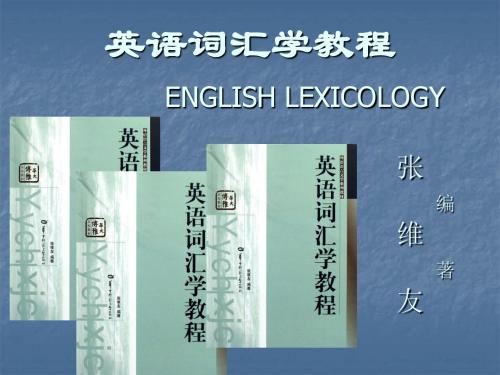
兼任 湖北省学位委员会评议组成员、华中师范大学学位 委员会第3、4届委员、教育部人文社科基地华中师大语言 与语言教育研究中心兼职研究员。学术兼职包括全国专业 英语研究会理事、中南地区外语教学法研究会副理事长、 湖北省翻译者协会副会长、武汉欧美同学会常务理事等。 被邀担任教育部全国本科教学评估专家和教育部出国留学 基金语言学评审专家。同时担任上海外语教育出版社教育 部"十五"规划项目英语专业教材编写委员会委员,重庆出 版社中西部英语专业系列教材编写委员会委员。 主讲 英语词汇学、文体学、语义学等理论课程。从事语 言学和应用语言学方面的研究,并对话语篇章、语用、语 言与文化等有浓厚的兴趣。
近年来,汪榕培教授在中国古典文学英译和中西 文化比较等方面取得了突破性的进展,先后完成 了 《英译老子》、《英译易经》、 《英译陶诗》、 《英译诗经》、《英译庄子》、 《英译邯郸记》 《英译汉魏六朝诗三百首》、 《英译牡丹亭》、 《英译孔雀东南飞· 木兰诗》、等译著, 并撰写了一系列相关的论文,出版了专著《比较 与翻译》和《陶渊明诗歌英译比较研究》,得到 国内外学者的高度重视。他目前正在继续进行典 籍英译研究工作,兼任苏州大学、大连理工大学 博士生导师。
What we shall learn in ish lexicology is more than to learn to remember new words,but it will make you powerful in learning new words. 有人误认为词汇学就是“学词汇”。
4.所有作业,独立完成,不能抄袭 ,否则扣分。
Chapter One
The Basic Concepts of Words and Vocabulary
大学英语专业导论学习心得
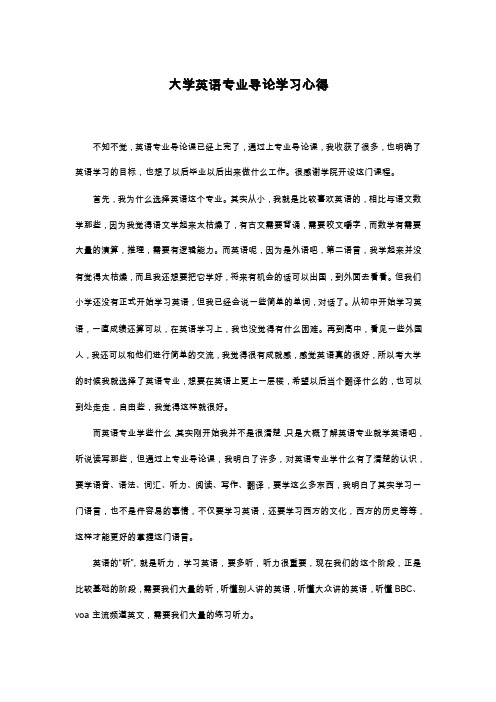
大学英语专业导论学习心得不知不觉,英语专业导论课已经上完了,通过上专业导论课,我收获了很多,也明确了英语学习的目标,也想了以后毕业以后出来做什么工作。
很感谢学院开设这门课程。
首先,我为什么选择英语这个专业。
其实从小,我就是比较喜欢英语的,相比与语文数学那些,因为我觉得语文学起来太枯燥了,有古文需要背诵,需要咬文嚼字,而数学有需要大量的演算,推理,需要有逻辑能力。
而英语呢,因为是外语吧,第二语言,我学起来并没有觉得太枯燥,而且我还想要把它学好,将来有机会的话可以出国,到外面去看看。
但我们小学还没有正式开始学习英语,但我已经会说一些简单的单词,对话了。
从初中开始学习英语,一直成绩还算可以,在英语学习上,我也没觉得有什么困难。
再到高中,看见一些外国人,我还可以和他们进行简单的交流,我觉得很有成就感,感觉英语真的很好,所以考大学的时候我就选择了英语专业,想要在英语上更上一层楼,希望以后当个翻译什么的,也可以到处走走,自由些,我觉得这样就很好。
而英语专业学些什么,其实刚开始我并不是很清楚,只是大概了解英语专业就学英语吧,听说读写那些,但通过上专业导论课,我明白了许多,对英语专业学什么有了清楚的认识,要学语音、语法、词汇、听力、阅读、写作、翻译,要学这么多东西,我明白了其实学习一门语言,也不是件容易的事情,不仅要学习英语,还要学习西方的文化,西方的历史等等,这样才能更好的掌握这门语言。
英语的“听”,就是听力,学习英语,要多听,听力很重要,现在我们的这个阶段,正是比较基础的阶段,需要我们大量的听,听懂别人讲的英语,听懂大众讲的英语,听懂BBC、voa主流频道英文,需要我们大量的练习听力。
英语的“说”,也很重要,一门语言就是用来交流的工具,只有说出来,这门语言才会得到运用,但现在,一些人学的是哑巴英语,学习英语更要学会怎么去说出来。
说的时候,也要注意语音,发音准确,让别人听懂和理解,这样英语才算学好了的。
英语的“读”,是要我们广泛的阅读,多读些文学、社会学、心理学、新闻报道的题材,这样才能增加我们的见识,开阔我们的眼界,学习英语,不仅仅只学习这门语言,多个方面都要涉及到,这样才能更好的去掌握它。
